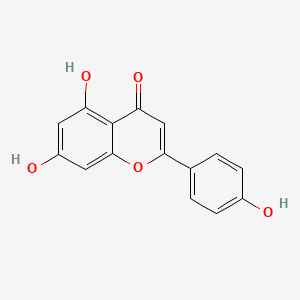apigenin
apigenin is a lipid of Polyketides (PK) class. Apigenin is associated with abnormalities such as Morphologically altered structure, Chimera disorder, Hypertensive disease, infection induced and Infection. The involved functions are known as inhibitors, Gene Expression, Process, Metabolic Inhibition and Cell Death. Apigenin often locates in Vacuole, Cytoplasmic matrix, Cytoplasm, Tissue membrane and Membrane. The associated genes with apigenin are MSMP gene, BCL2 gene, PTGS2 gene, Chromatin and SLC33A1 gene. The related lipids are Lipopolysaccharides, Steroids, 1-Butanol, agosterol A and Butyrates. The related experimental models are Mouse Model, Tissue Model, Knock-out, Xenograft Model and Disease model.
References related to experimental models published in Others
| PMID | Journal | Published Date | Author | Title |
|---|---|---|---|---|
| 20511675 | Exp. Biol. Med. (Maywood) | 2010 | Leonardi T et al. | Apigenin and naringenin suppress colon carcinogenesis through the aberrant crypt stage in azoxymethane-treated rats. |
| 17982104 | J. Immunol. | 2007 | Nicholas C et al. | Apigenin blocks lipopolysaccharide-induced lethality in vivo and proinflammatory cytokines expression by inactivating NF-kappaB through the suppression of p65 phosphorylation. |
| 18725386 | Carcinogenesis | 2008 | Kaur P et al. | Plant flavonoid apigenin inactivates Akt to trigger apoptosis in human prostate cancer: an in vitro and in vivo study. |
| 23113475 | FEMS Microbiol. Lett. | 2013 | Dong J et al. | Apigenin alleviates the symptoms of Staphylococcus aureus pneumonia by inhibiting the production of alpha-hemolysin. |
